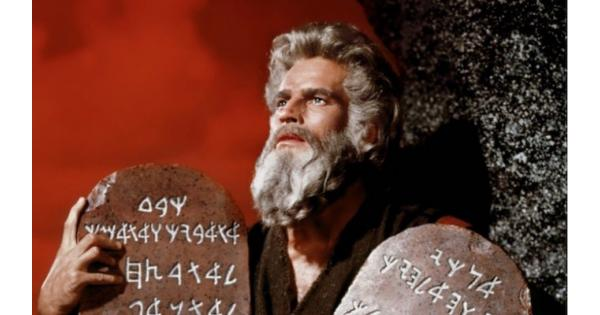To accompany your Come Follow Me study for April 25-May 1
In addition to reading these chapters, you may want to:
- See the video Come Follow Me 2022 (April 25 – May 1) Exodus 24-34 | Don’t Dance With the Cow at https://www.youtube.com/watch?v=Lv09GC44mco
- Read the portion of the Old Testament Institute Student Manual relating to these chapters at https://www.churchofjesuschrist.org/study/manual/old-testament-student-manual-genesis-2-samuel/exodus-21-24-31-35-the-mosaic-law-a-preparatory-gospel?lang=eng
- Read the Joseph Smith Translation clarifications for these chapters at https://www.churchofjesuschrist.org/study/scriptures/jst/jst-ex?lang=eng
If you would like a Kahoot game related to this material which you could use for personal study or use with your family or your class, click here: https://create.kahoot.it/share/exodus-24-31-34/61f5c1d4-bfac-4950-96aa-f0b364f6693f
Points to Ponder in Exodus 24, 31-34
1. What do we read in Exodus 24 that makes clear why God was so angry at the people when they were worshipping a golden calf so soon thereafter?
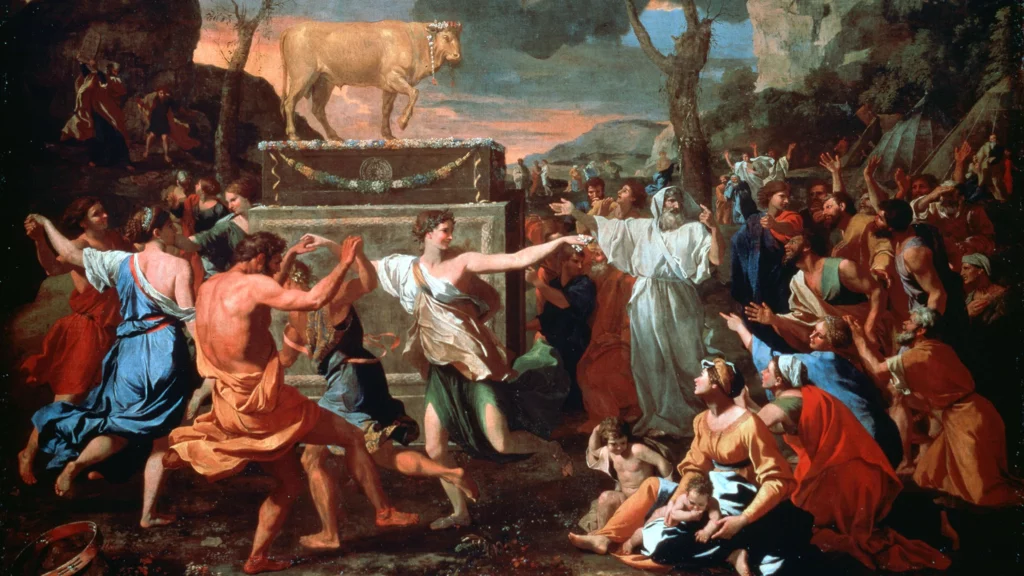
2. How could the entire nation of Israel forget their covenants so quickly? What lesson is there for us in this?
3. Why would the lesser priesthood be named after someone who made a golden calf for Israel’s idolatrous worship?

4. What vital additions did Joseph Smith make to the Exodus record pertaining to the second set of tablets the Lord prepared for Moses? How did the second set differ from the first set?
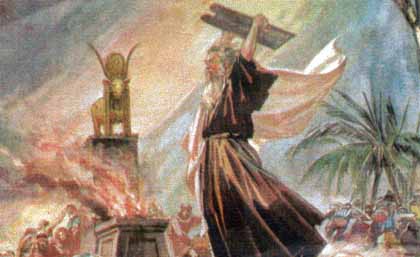
5. What other essential contributions does the Joseph Smith Translation make to our understanding of these chapters?
6. What principles, applicable in our lives today, can we learn from God’s substitution of the “lesser law” on the second set of plates for the higher law which was contained on the first set?
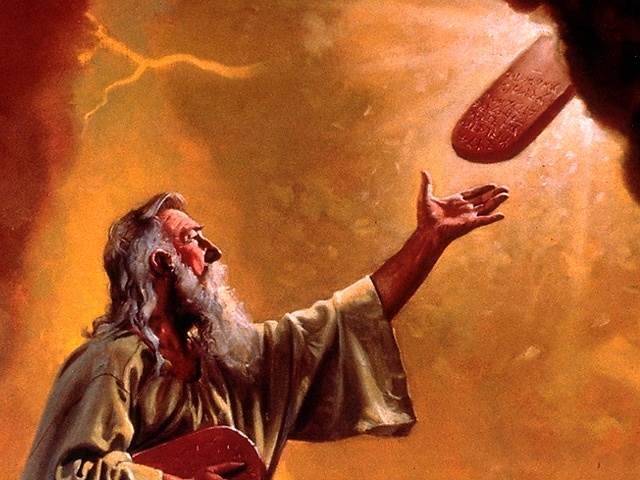
7. Name three men other than Moses who saw God in this week’s reading. How many other unnamed ones also saw Him? What was the point of this vision?
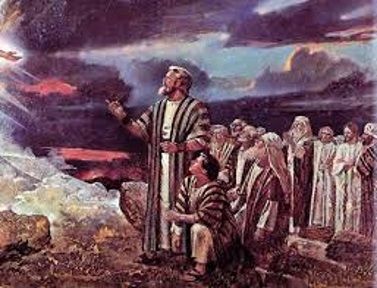
8. It has been said that “apparently it was a far greater challenge to get Egypt out of Israel than to get Israel out of Egypt.” Do you agree? Explain.
9. What is especially notable about the description given of God’s appearance to people in these chapters?

10. These chapters are among the most miracle-filled of all scripture. In addition to God’s speaking to Moses frequently and appearing to him and 73 others on Mt. Sinai, how many other miracles can you find in these five chapters where God intervened to bless the Israelites?
11. Why would the Lord have prescribed the death penalty for sabbath violation, when almost no one would be alive if that were enforced today?
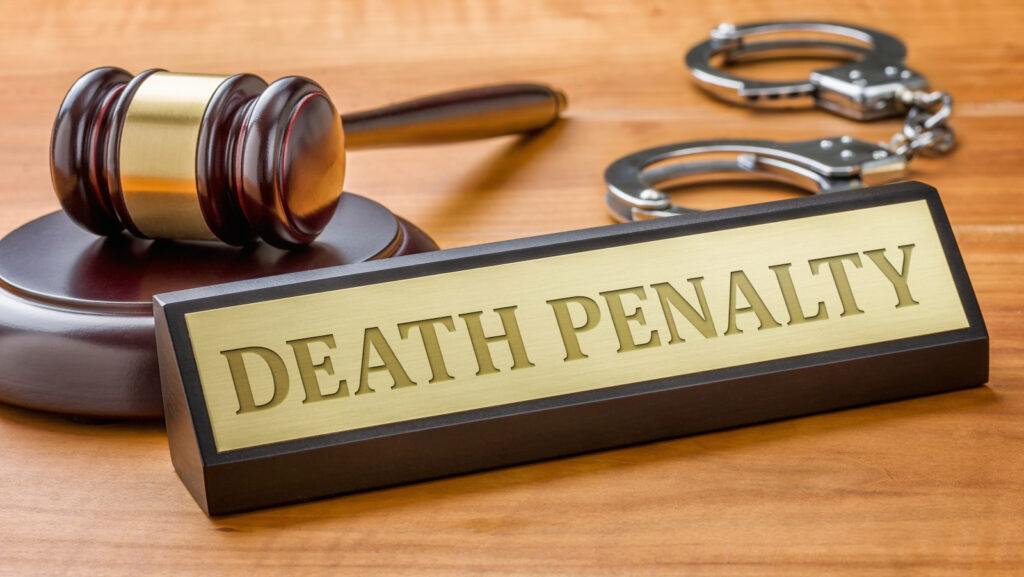
12. Why did the Lord not want the Israelites to make any “covenants” or alliances with the inhabitants of the promised land? (34:12)
13. When Moses commanded the people in the name of the Lord to “slay every man his brother, and every man his companion, and every man his neighbour” (32:27), why were only 3000 killed, when there were reportedly 600,000 men among them?
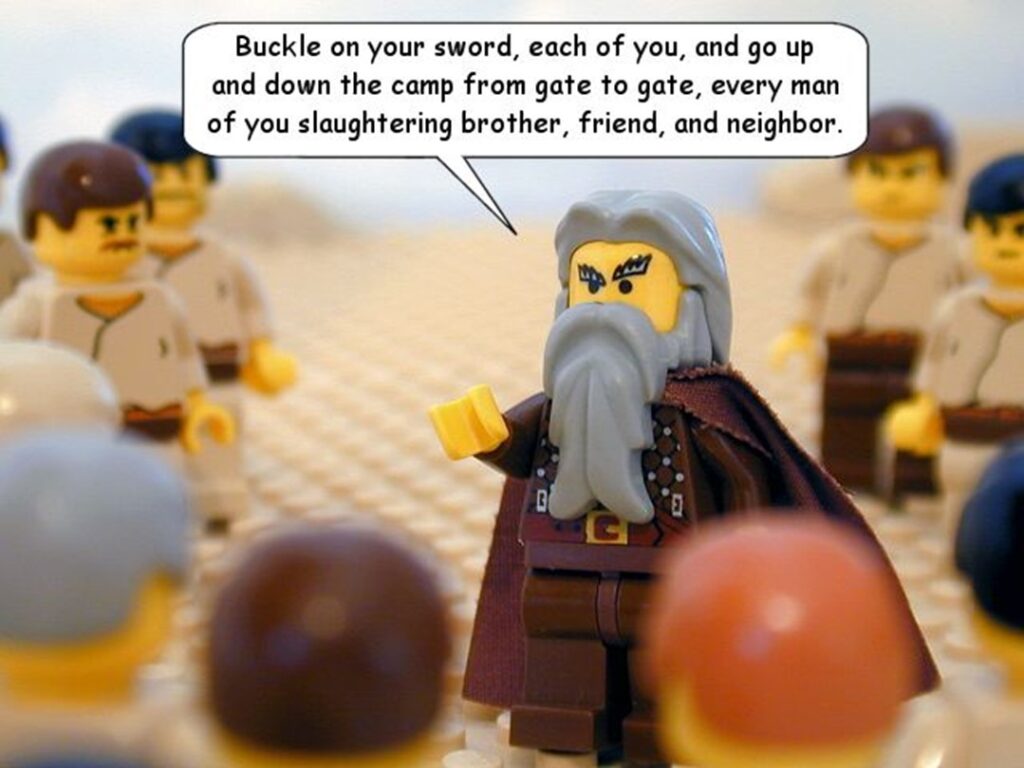
14. Why did Michaelangelo’s statue of Moses (below) show Moses with horns? How do we know he didn’t really have them?
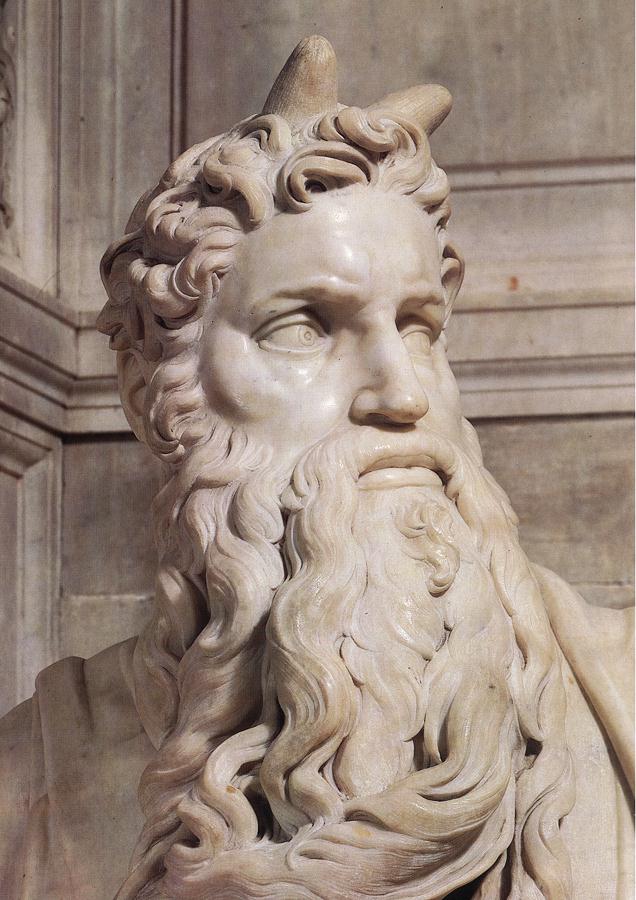
Possible Answers to Points to Ponder in Exodus 24, 31-34
1. What do we read in Exodus 24 that makes clear why God was so angry at the people when they were worshipping a golden calf so soon thereafter?
They had twice promised (24:3, 7) that “all the words which the Lord hath said will we do.” Just as transgression is more serious for a baptized member than for a non-member, and more serious yet for one who has made temple covenants, so was it more serious for Israel to transgress after solemnly promising God they would not.
2. How could the entire nation of Israel forget their covenants so quickly? What lesson is there for us in this?
We don’t have the details of why Israel so soon forgot, but it is likely they didn’t really try to keep the covenants they had so recently made and teach each other the importance of doing so. They likely became lax in their prayers and in their attention to the details of the Ten Commandments and other instructions they had so recently heard God Himself speak from Sinai. Just as we can become physically weak in a matter of days, if we don’t eat physical food, so can we become spiritually weak just as quickly, but be less likely to notice it, if we don’t constantly nourish our spiritual selves.
3. Why would the lesser priesthood be named after someone who made a golden calf for Israel’s idolatrous worship?
Aaron is so honored not because of the golden calf episode but in spite of it. Though the Lord was very angry with Aaron (Deut. 9:20), Aaron obviously repented and was allowed to continue in his priestly office. Other than for this one major slip, Aaron was a great example of a worthy priesthood holder. It is worth noting, as the Institute student manual points out, that Aaron may not have been attempting to substitute the worship of the golden calf for the worship of God but could have hoped to use the golden calf as a symbol of the true God and point the people toward appropriate worship through that visual aid. The fact that God was extremely angry about it shows that it was a poor decision on Aaron’s part, but not necessarily a mark of rebellion. We also see here God’s mercy in rewarding Aaron for what he became and not perpetually punish him for what he once did in a weak moment.
4. What vital additions did Joseph Smith make to the Exodus record pertaining to the second set of tablets the Lord prepared for Moses? How did the second set differ from the first set?
The second set did not contain the ordinances of the Melchizedek Priesthood, including temple ordinances, as did the first, and it clarified that the Lord’s personal presence would not attend them as would otherwise have been their privilege. And the second set had a law of carnal commandments, rites, and ordinances added to help the Israelites progress from where they were to where they needed to be.
5. What other essential contributions does the Joseph Smith Translation make to our understanding of these chapters?
- God did not “repent,” as Exodus 32:14 would have us believe, but offered to spare the people if they would repent, as Moses promised they would.
- It is not true that no man can see God and live, as the uncorrected version of Exodus 33:20 indicates, but it is true that no “sinful” man can see God and live.
6. What principles, applicable in our lives today, can we learn from God’s substitution of the “lesser law” on the second set of plates for the higher law which was contained on the first set?
They could include:
- The “lesser law” was not intended as a punishment, but as a blessing to the Israelites, to help them eventually get to the point they could enjoy more. Likewise, we can delegate responsibilities in the ward or in our homes commensurate with where others are now, not with where we wished they already were.
- Giving someone too much responsibility too early, before he is prepared for it, could prove a curse and cause him to give up and become less active. It is important to provide others with success experiences, not with repeated failure.
- Young men or new converts who hold the Aaronic Priesthood should be given significant responsibilities and opportunity to use that priesthood to prepare them for later receiving the Melchizedek Priesthood.
7. Name three men other than Moses who saw God in this week’s reading. How many other unnamed ones also saw Him? What was the point of this vision?
Aaron, Nadab, and Abihu (24:9-11), in addition to 70 other unnamed “elders of Israel,” saw Him. God would have loved to have shown Himself to the entire congregation, had they been prepared. As D&C 84:23 tells us, Moses “sought diligently to sanctify his people that they might behold the face of God.” But despite Moses’ efforts, these 74 seem to have been the only ones who were prepared for this great experience, and to “enter into [the Lord’s] rest while in the wilderness.” For others it would have been a curse, not a blessing. There are repeated promises in the Doctrine and Covenants that we can progress to the point that we can each see the face of God. That may or may not occur in this life, but if we aren’t preparing ourselves for that experience, we are likely to find that being in His presence on judgment day will be an uncomfortable experience.
8. It has been said that “apparently it was a far greater challenge to get Egypt out of Israel than to get Israel out of Egypt.” Do you agree? Explain.
Though the Lord had to intervene with many miracles both before and after the Exodus, He succeeded in getting 600,000 men plus their wives and children out of Egypt into the desert. But getting “Egypt out of Israel,” or getting Israel to abandon the corrupt religious practices and forget the comparative comforts and temptations of Egyptian culture required the willing participation of each Israelite, as God will never force the human mind. As we see in this week’s reading, only 74 men were willing to make the necessary sacrifices to fully divest themselves of the negative influence of Egypt.
9. What is especially notable about the description given of God’s appearance to people in these chapters?
More than in most other places in the Bible, these visions mention a variety of God’s body parts, including his face, hand, finger, back parts, and feet. Clearly, the true God is not a god “without body, parts, or passions,” as the apostate Christian world has taught.
10. These chapters are among the most miracle-filled of all scripture. In addition to God’s speaking to Moses frequently and appearing to him and 73 others on Mt. Sinai, how many other miracles can you find in these five chapters where God intervened to bless the Israelites?
- Moses survives 40 days and nights on top of Mt. Sinai, where there was no access to food or water. (24:18)
- God filled Bezaleel with wisdom, understanding, and knowledge to enable him to oversee the building of the tabernacle. (31:3)
- The Lord filled the hearts of others with wisdom to assist. (31:6)
- The Lord physically made two tables of stone, engraven with His own finger. (31:18)
- The Lord “plagued the people because they made the calf.” (32:35)
- A cloudy pillar, visible to all, descended upon the temporary “tabernacle” Moses set up outside the camp as a place for him to meet regularly with the Lord. (33:9)
- Moses survived a second 40 day and night episode on Mt. Sinai with no food or water. (34:28)
- Moses’ face shone when he came down from Sinai (34:29)
11. Why would the Lord have prescribed the death penalty for sabbath violation, when almost no one would be alive if that were enforced today?
The Lord was obviously trying to save their spiritual lives by threatening to take away their physical lives if they violated the sabbath and thereby starved themselves of the spiritual sustenance they would so much need. It would be far better to die physically than to die spiritually.
12. Why did the Lord not want the Israelites to make any “covenants” or alliances with the inhabitants of the promised land? (34:12)
The wickedness of those living there was so pervasive that it would be a “snare” to the Israelites, especially if they intermarried with them. The Lord’s instructions were to be that all those Amorites, Canaanites, Hittites, etc., were to be killed and their altars, images, and sacred groves destroyed.
13. When Moses commanded the people in the name of the Lord to “slay every man his brother, and every man his companion, and every man his neighbour” (32:27), why were only 3000 killed, when there were reportedly 600,000 men among them?
Presumably these 3000 were the only ones who would not repent and avail themselves of the Lord’s offer to spare those who did. We can be sure that Moses did not give an order for everyone to start killing their neighbors indiscriminately, but for legal authorities to kill those who were so recalcitrant they were unwilling to repent and who would therefore pose a mortal danger to the Israelites’ spiritual wellbeing.
14. Why did Michaelangelo’s statue of Moses show Moses with horns? How do we know he didn’t really have them?
Michaelangelo was relying on the Latin Vulgate version of the Bible, which erroneously translated the Hebrew word meaning “shone” as “horned.” Moses’ appearance was similar to that of Abinadi (Mosiah 13:5) and to that of Joseph Smith after seeing the vision recorded in D&C 76.
